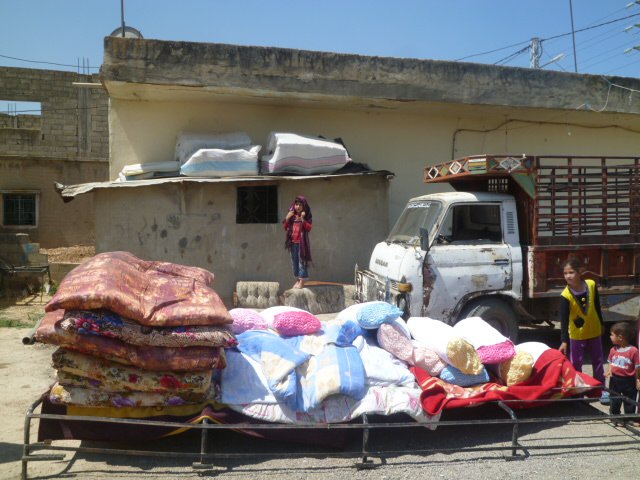 The Battles of Damascus and Aleppo pushed new waves of Syrian refugees. A sorrowful example for all: the Old City of Homs, where there were nearly one hundred thousand Christians, currently has a few dozens. Most of the refugees are still inside: from Aleppo to Damascus, from Homs to Aleppo, from Deir el Zoor to other cities, from Hama to the villages and towns that seem to be less affected by the fighting. But the scenario is changing rapidly and new flows of refugees move, lacking everything. A part of those abroad is in Turkey, another one in Jordan, and about 50,000 in Lebanon. The Battles of Damascus and Aleppo pushed new waves of Syrian refugees. A sorrowful example for all: the Old City of Homs, where there were nearly one hundred thousand Christians, currently has a few dozens. Most of the refugees are still inside: from Aleppo to Damascus, from Homs to Aleppo, from Deir el Zoor to other cities, from Hama to the villages and towns that seem to be less affected by the fighting. But the scenario is changing rapidly and new flows of refugees move, lacking everything. A part of those abroad is in Turkey, another one in Jordan, and about 50,000 in Lebanon.
We went to find and help the displaced of recent weeks.
Approximately 35,000 were recorded by the High Commissioner for Refugees. In this way they were admotted to assistance. Many are in houses, rented, or in adapted places at the north, in the area of Tripoli, in Beirut and suburbs, in the Bekaa Valley, in Baalbek. Only in Tripoli 3,000 are estimated to be in the process of being registered. Some fear that by registering, they will enter the lists and can be excluded from the opportunity to return to Syria afterwards. We tried to meet some of those who have no protection, and to understand where are the areas of greatest need, in Lebanon. Who are the displaced.
 Syrians, not only Christians, even if Lebanon, compared to Turkey and Jordan, has predominantly Christian areas that are the center of attraction in the fear of tomorrow. Syrians, not only Christians, even if Lebanon, compared to Turkey and Jordan, has predominantly Christian areas that are the center of attraction in the fear of tomorrow.
One evening in Beirut. Food aid in the suburbs
Beirut is a city in rapid growth. Large hotels, shopping centers, cranes that never cease to rebuild. The Corniche, the legendary waterfront of the "bella vita" at the beginning of the twentieth century or of the sixties, lost in poetry and gained power, with its skyline that makes it look like Miami or some other western place with shores and night clubs. But in Beirut, there are several "towns", which do not communicate much with each other.
We found Syrian and Lebanese friends with whom we entered the Palestinian camps of Beirut (there are many, we remember the names of those involved in the war of the Eighties, such as Sabra and Shatila).
In the Palestinian camps there are some hundreds of families of Syrian refugees who have rented "micro-homes" with few windows and a lot of mice, where to get shelter. The Palestinians have agreed to let them enter. they take little money, these are the lower rents that exist in Beirut. There is no work, there is no food, 70 percent are women and children.
We started to help at least for the basic necessities: in the house of a family living there for thirty years (two rooms, no window) we brought food packs for 55 families, 6-7 kg rice, sugar, beans, beans, pasta. We have brought this with young intelligent volunteers (working aday), from nine o'clock in the evening in various homes of Syrian refugees. In one of the buildings, the sewer is broken, the sewage flooded the stairs. On the lower floors to get in we cross a plate of wood, put there to stop the mice.
Altogether there are about 200 families. We want to try to ensure the necessary for these families, about a thousand people. And we are studying the possibility of a self-managed school for children, with the young volunteers with whom we work. We are creating a relationship with a Lebanese Foundation, which can offer free consultations and health care for the needs of inpatient and outpatient at the hospital Hariri in Beirut, with the help of GNK Foundation and Dr. Inati.
A trip and first aid in the Bekaa
 Many families from the countryside of Homs arrived in the Bekaa Valley. At a first sight black clothing prevails, they are all women, some elderly, children in their arms, at the Centre of Caritas Migrants Taalabaya. We drive to a quarter fifteen minutes away from there. There is a tent camp in Dahlamjeh, with 200 families, a water nozzle to fill the tanks, hundreds of children. Latrines and lime. It's almost 40 degrees in the shade. But there is only sun. Few clothes, no milk, no diapers, food is just what we give together with Caritas. In the area surveyed by Caritas Migrants there are 800 families. Some live in rented houses in Zahle, which is a Christian town in the East Bekaa. Christians are the poorest refugees here. There are those who were injured in the clashes, those who have chronic diseases, such as diabetes and some medicines are no longer available. We started to help in this area. Many families from the countryside of Homs arrived in the Bekaa Valley. At a first sight black clothing prevails, they are all women, some elderly, children in their arms, at the Centre of Caritas Migrants Taalabaya. We drive to a quarter fifteen minutes away from there. There is a tent camp in Dahlamjeh, with 200 families, a water nozzle to fill the tanks, hundreds of children. Latrines and lime. It's almost 40 degrees in the shade. But there is only sun. Few clothes, no milk, no diapers, food is just what we give together with Caritas. In the area surveyed by Caritas Migrants there are 800 families. Some live in rented houses in Zahle, which is a Christian town in the East Bekaa. Christians are the poorest refugees here. There are those who were injured in the clashes, those who have chronic diseases, such as diabetes and some medicines are no longer available. We started to help in this area.
In the Nort Bekaah there are four camps. Two are close to each other, Ras Baalbek and Al Fakiha, 160 families. In camps Masharic Kaa and Ersal there are 1070 families. We start helping in the smaller fields. There is the chance to open, with thirty Lebanese volunteers, a school for 500 children.
We're just beginning.

|

